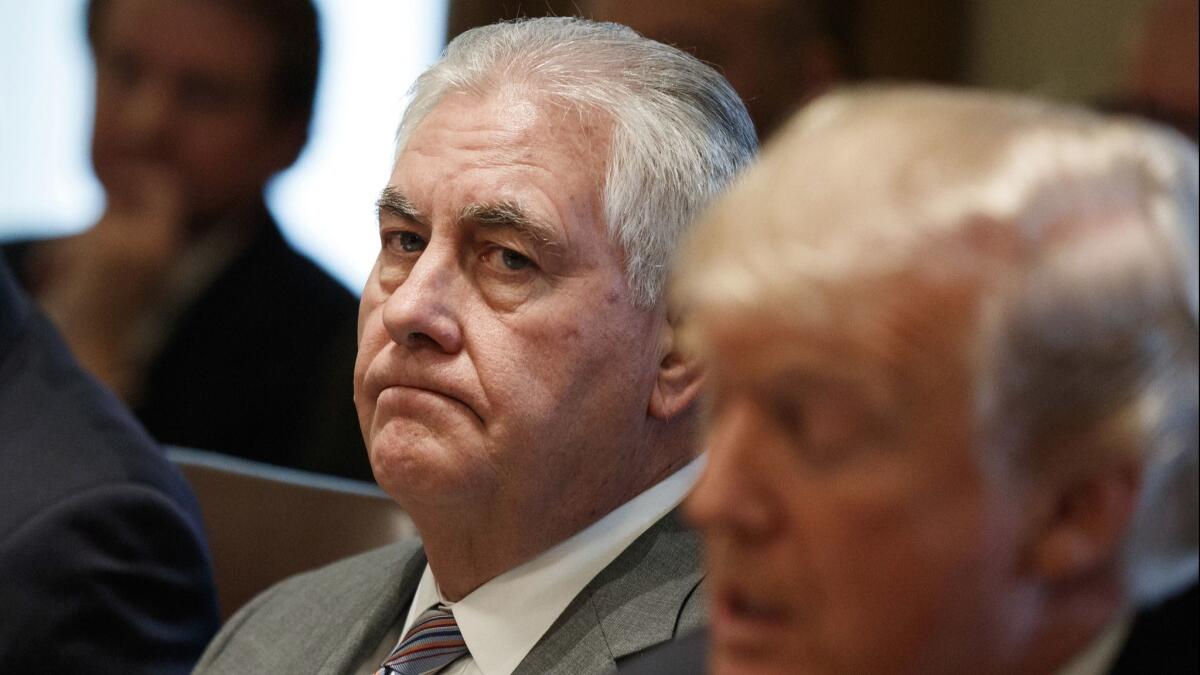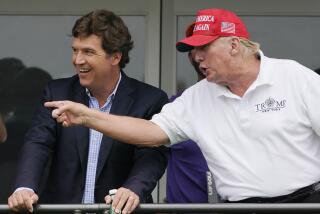Op-Ed: The real Rex Tillerson mystery isnât why he was fired, itâs how he lasted so long

The mystery isnât why Rex Tillerson was fired this week. Itâs why he lasted so long.
Tillerson, a thoroughly conventional conservative who became secretary of State on the strength of a career negotiating oil deals for Exxon, was out of step with his boss from the start.
He was a George W. Bush Republican in a Donald Trump world. His chief sponsors were Bush aides, Condoleezza Rice and Robert M. Gates. He was the embodiment of the theory that Trump would âpivotâ toward traditional GOP policies after his inauguration. But the pivot never happened.
Tillerson was simply bad at his job.
That left Trump and Tillerson at odds on major issues. Trumpâs version of âAmerica Firstâ views international alliances as costly encumbrances; Tillerson wanted to preserve them. Trump wanted to tear up Barack Obamaâs 2015 nuclear deal with Iran; Tillerson wanted to keep it. Trump pulled the United States out of the Paris agreement on climate change; Tillerson wanted to stay in.
If that werenât enough, Tillerson was simply bad at his job. Instead of focusing on diplomacy, he spent much of his time redesigning the State Department bureaucracy and offering to cut his own budget.
Tillersonâs defenders said he was a voice for moderation, and he was â but an ineffective one. Trump undercut him relentlessly, dismissed his attempts to negotiate a deal with North Korea as useless, and finally took over the effort himself.
Nor did Tillerson ever sincerely attempt to win over his boss on a personal level. When NBC reported that Tillerson had privately called Trump a âmoron,â the secretary of State denounced the report â but never quite denied it.
Rumors began circulating almost six months ago that Trump was ready to fire his ill-fitting secretary of State. The reports even named the most likely successor: CIA Director Mike Pompeo.
So Tillersonâs dismissal came as the least surprising, and least graceful, firing in recent political history â the first time a president has ever fired a Cabinet member on Twitter.
The clumsy episode revived a perennial question: Can anyone who agrees to serve Trump escape without serious damage to his reputation?
Pompeo is about to find out.
On the surface, the former tea party congressman from Kansas looks like the anti-Tillerson. Tillerson is taciturn, understated and imperious. Pompeo is swaggering, loquacious and brashly hard line.
The CIA, he said last year, âmust be aggressive, vicious ⌠[and] focused on crushing our enemies.â
Heâs won Trumpâs heart the same way Defense Secretary James N. âMad Dogâ Mattis did, by sounding like a take-no-prisoners tough guy.
Pompeo is clearly more hawkish than Tillerson, especially on Iran. After Trumpâs election, then-Congressman Pompeo said he looked forward âto rolling back this disastrous deal with the worldâs largest state sponsor of terrorism.â He has accused American Muslim leaders of being âpotentially complicitâ in domestic terrorism.
But Pompeo, who learned international politics at West Point and graduated from Harvard Law School, is also quite capable of nuance and revision.
Once installed at the CIA, he acknowledged that the Iran deal had put the United States âin a marginally better placeâ because it allowed international inspections of nuclear facilities.
On North Korea, he believes it may be impossible to force Kim Jong Un to dismantle his nuclear force immediately, and that the United States should pursue the âsecondary goalâ of stopping nuclear tests.
And he has endorsed the intelligence communityâs view that Russiaâs Vladimir Putin meddled in the 2016 election and is trying to meddle again â an unusual break from the president. He has consistently argued that Russia is a bigger threat than Trump seems to think.
So itâs not clear that Pompeoâs ascent means a major shift in foreign policy. Instead, it likely means a more effective Trump foreign policy â one with the State Department inside the circle of decision-makers, instead of outside.
Long before this week, Trump wasnât listening to Tillerson; he was listening to Pompeo, who often delivered the presidentâs morning intelligence briefing in person.
The question for Pompeo, now that he is getting the most important job in the Cabinet, is how he will define his role. Will he be Trumpâs enabler â or will he try to restrain the presidentâs undiplomatic impulses, as Tillerson tried to do? Will he submit to Trumpâs worst instincts? Or will he tell the president when heâs wrong?
And will Trump listen?
Doyle McManus is a contributing writer to Opinion.
Twitter: @doylemcmanus
Follow the Opinion section on Twitter @latimesopinion or Facebook
More to Read
A cure for the common opinion
Get thought-provoking perspectives with our weekly newsletter.
You may occasionally receive promotional content from the Los Angeles Times.











